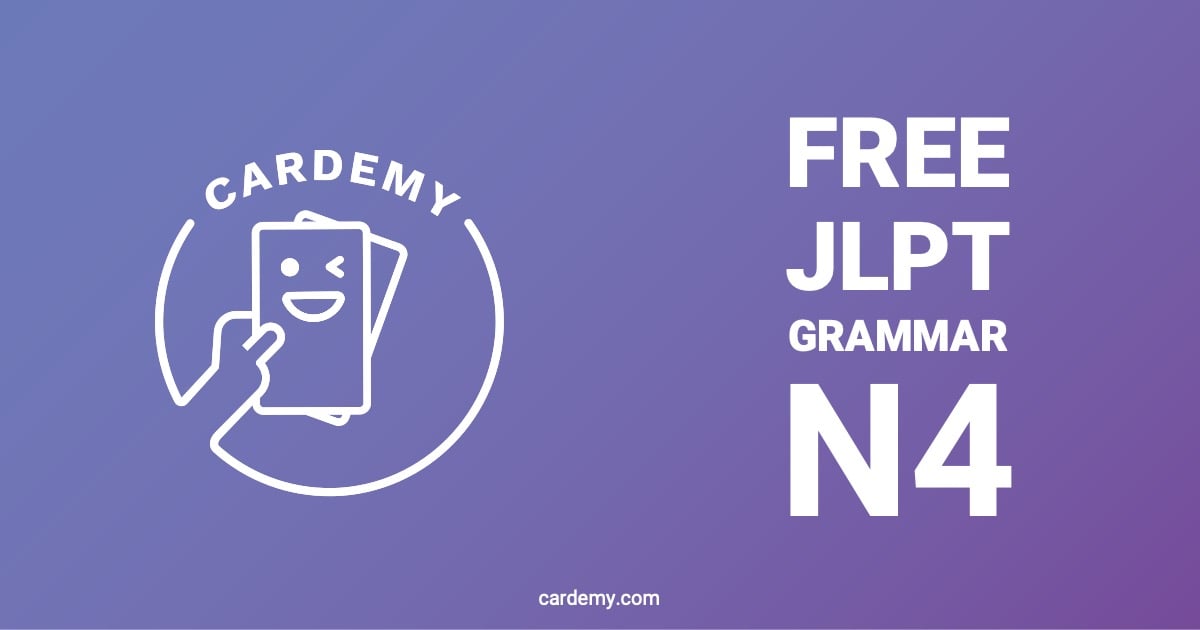Expressing prohibition (must not)〜てはいけない
We express prohibition with て form + は + いけない ou だめ ou ならない.
ここで、 煙草を 吸ってはいけません。
You should not smoke here.
だめ has the opposite meaning of 良い / いい.
だめ is used to mean "not allowed to do". It is a less formal expression and is used more orally.
ここで、 煙草を 吸ってはならない。
Smoking is not allowed in this area.
ならない has a stronger meaning than いけない but overall the meaning is similar.
ならない is often used in the case of regulations or laws, rather in writing.
ちゃだめ and じゃだめ are the contracted forms of てはだめ and ではだめ (colloquial language).
ちゃだめ and じゃだめ are the contracted forms of てはだめ and ではだめ (colloquial language).
Expressing obligation (must)〜なくてはいけない
To indicate that an action must be done (obligation), we combine the negation with the prohibition form we just saw.
Obligation = Negation + Prohibition (= prohibition not to do).
The negation can be formed with 3 different forms.
Obligation = Negation + Prohibition (= prohibition not to do).
The negation can be formed with 3 different forms.
|
Obligation
|
Negation
|
Prohibition
|
|---|---|---|
|
Negative て form
|
(なくて)は
|
いけない
|
|
Negative verbs
|
(ない)と
|
だめ
|
|
Negative verbs
い replaced by なけれ |
(なけれ)ば
|
ならない
|
For example for する (do)
しなくては いけない
しないと だめ
しなければ ならない
しないと だめ
しなければ ならない
勉強をしなくては、 いけません。
You have to study.
勉強をしないと、 だめ。
It's no good if you don't study.
勉強をしなければ、 ならない。
We have to study.
野菜も 食べなくては、 だめです。
You must also eat the vegetables.
Exercices
Conjugate the verbs below to express obligation.
水を飲む。 (with いけない )
Answer →
水を飲まなくてはいけない。
Translation →
You must drink water.
薬を飲む。 (with だめ )
Answer →
薬を飲まないとだめ。
Translation →
It's not good if you don't take medication.
買う。 (with ならない)
Answer →
買わなければならない。
Translation →
You must buy.
Because the forms of prohibition and obligation are particularly long, their informal variations are often used in speech.
しちゃ だめ (must not do)
食べちゃ だめ (must not eat)
In informal conversations, it is possible to omit the final part. This does not prevent the listeners from understanding the meaning.
しなくちゃだめ (must do)
しなくちゃ (must do)
しなきゃいけない (must do)
しなきゃ (must do)
Informal forms of prohibition
|
Formal
|
Informal
|
|
|---|---|---|
|
て form
|
は いけない
|
ちゃ いけない
|
|
て form
|
は だめ
|
ちゃ だめ
|
|
て form
|
は ならない
|
ちゃ ならない
|
しちゃ だめ (must not do)
しちゃ いけない (must not do)
食べちゃ だめ (must not eat)
食べちゃ いけない (must not eat)
Informal forms of obligation
| Formal |
Informal
|
|
|---|---|---|
|
Negative て form
|
(なくて) は いけない
|
(なくちゃ) いけない
|
|
Negative verbs
|
(ない) と だめ
|
(なくちゃ) だめ
|
|
Negative verbs conditional
Replace い with なけれ |
(なければ) ならない
|
(なきゃ) ならない
|
しなくちゃだめ (must do)
しなくちゃ (must do)
しなきゃいけない (must do)
しなきゃ (must do)
食べなくちゃいけない (must eat)
食べなくちゃ (must eat)
食べなくちゃ (must eat)
食べなきゃいけない (must eat)
食べなきゃ (must eat)
Expressing permission (can) 〜てもいい
To express permission we conjugate the verb in the form て and then add もいい.
A : これ、 食べてもいい?
Can I eat this?
Can I eat this?
B1 : 食べちゃだめ。
You can't eat it. (form of the prohibition)
B2 : 食べてもいいよ。
You can eat.
It is also possible to replace いい with よい or よろしい to increase the politeness level.
日本語を話してもいいですか。
Can I speak in Japanese?
日本語を話してもいいです。
You can speak in Japanese.
日本語を話しては、いけません。
Do not speak Japanese.
Transform these sentences to ask permission and respond in a positive way.
水を 飲む。 (Ask permission and answer that it is allowed)
Answer →
水を 飲んでもいい? 飲んでもいい。
Translation →
Can I (can we) drink water? You can (we can) drink it.
音楽を 聞く。 (Ask permission and answer that it is allowed)
Answer →
音楽を 聞いてもいいですか。 聞いてもいいです。
Translation →
Can I (can we) listen to music? You can (we can) listen to it.
部屋に 入る。 (Ask permission and answer that it is allowed)
Answer →
部屋に 入ってもいいですか。 入ってもいいです。
Translation →
Can I (can we) enter the room? You can (we can)




Leave Comment